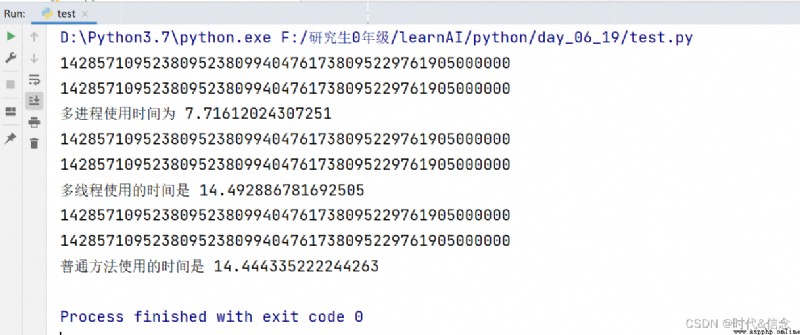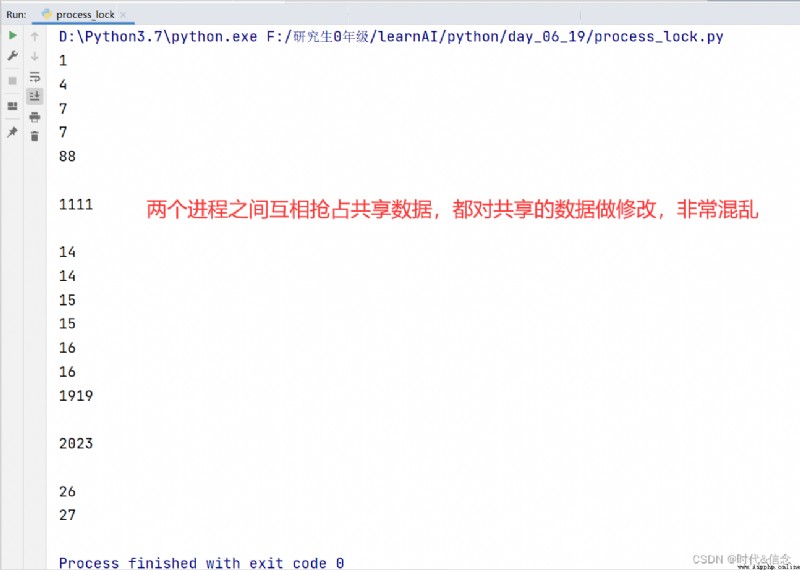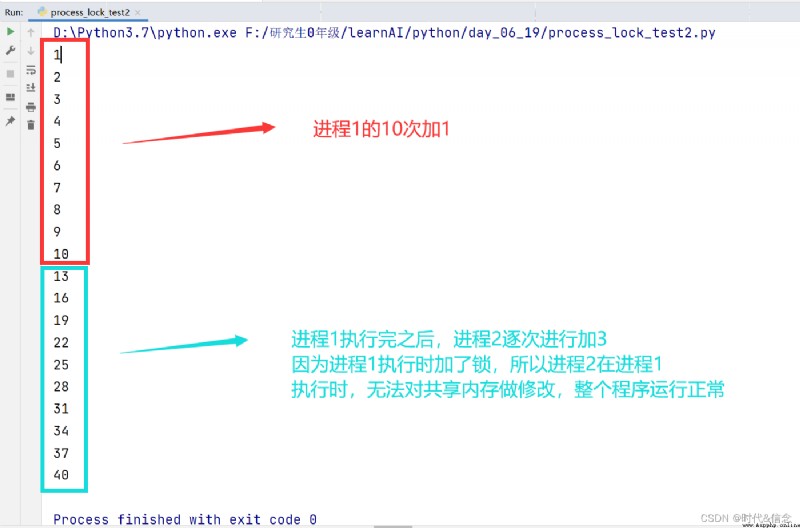What is multi process ?
Now our computers are multi-core , Generally speaking, it means multiple processing or computing units . In order to speed up computation and processing , We can delegate different tasks to multiple cores for simultaneous processing , Thus, the operation speed and efficiency are improved , Simultaneous operation of multiple cores means simultaneous operation of multiple processes , This is multi process .
The method of creating process and thread is basically the same , Look at the following code .
# coding:utf-8
# Import multi process packages , And rename to mp
import multiprocessing as mp
# Main work
def p1():
print("zxy")
if __name__ == "__main__":
# Create a new process
new_process = mp.Process(target=p1, name="p1")
# Start the process
new_process.start()
# Block the process
new_process.join()
Console rendering :
Why use in multiprocessing queue Well ?
Because multiprocessing is like multithreading , In the working function , Unable to get return Returns the result in the process function , So use queue Store the results , Take it out when you need it .
# coding:utf-8
import time
import multiprocessing as mp
""" When using multiprocessing , Time taken to run the program """
def job1(q):
res = 0
for i in range(100):
res += i + i**5 +i**8
time.sleep(0.1)
# Put the results in the queue
q.put(res)
def job2(q):
res = 0
for i in range(100):
res += i + i**5 +i**8
time.sleep(0.1)
q.put(res)
if __name__ == "__main__":
start_time = time.time()
# Create a queue
q = mp.Queue()
# Create a process 1
process1 = mp.Process(target=job1, args=(q,))
# Create a process 2
process2 = mp.Process(target=job2, args=(q,))
process1.start()
process2.start()
# Get the value through the queue
res1 = q.get()
res2 = q.get()
print("res1 by %d,res2 by %d" % (res1, res2))
end_time = time.time()
print(" The whole process takes %s" %(end_time-start_time))
design sketch :
Next, use multi process 、 Multithreading 、 And the common way of doing things without anything , See how effective their three methods are ?
# coding:utf-8
import multiprocessing as mp
import time
import threading as th
""" Multi process 、 Multithreading 、 Performance comparison of common methods """
# Multiprocess work
def mp_job(res):
for i in range(10000000):
res += i**5 + i**6
print(res)
# Multithreading
def mt_job(res):
for i in range(10000000):
res += i**5 + i**6
print(res)
# Common methods of working
def normal_job(res):
for i in range(10000000):
res += i ** 5 + i ** 6
print(res)
if __name__ == "__main__":
mp_sum = 0
mp_start = time.time()
process1 =mp.Process(target=mp_job, args=(mp_sum, ))
process2 = mp.Process(target=mp_job, args=(mp_sum,))
process1.start()
process2.start()
process1.join()
process2.join()
mp_end = time.time()
print(" Multi process usage time is ", (mp_end-mp_start))
mt_start = time.time()
mt_sum = 0
thread1 = th.Thread(target=mt_job, args=(mt_sum, ))
thread2 = th.Thread(target=mt_job, args=(mt_sum, ))
thread1.start()
thread2.start()
thread1.join()
thread2.join()
mt_end = time.time()
print(" The time used by multithreading is ", (mt_end-mt_start))
normal_start = time.time()
normal_sum = 0
# Do it twice
normal_job(normal_sum)
normal_job(normal_sum)
normal_end = time.time()
print(" The common method used is ", (normal_end-normal_start))
design sketch :
Experimental results show that : Multi process efficiency is really high !!!
What is the process pool for ?
The process pool is python A pool provided by multiple processes , Put all processes in this pool , Let the computer use the resources in the process pool by itself , So many processes can process some programs , In order to improve the work efficiency .
# coding:utf-8
import time
import multiprocessing as mp
""" The process of pool pool Use """
def job(num):
time.sleep(1)
return num * num
if __name__ == "__main__":
start_time = time.time()
# When there is no parameter in the bracket , All processes in the process pool are used by default
pool = mp.Pool()
res = pool.map(job, range(10))
print(res)
end_time = time.time()
print(" Run at ", (end_time-start_time))
design sketch :
# coding:utf-8
import time
import multiprocessing as mp
""" The process of pool pool Use """
def job(num):
time.sleep(1)
return num * num
if __name__ == "__main__":
start_time = time.time()
# When adding parameters in brackets , Specify two processes to process
pool = mp.Pool(processes=2)
res = pool.map(job, range(10))
print(res)
end_time = time.time()
print(" Run at ", (end_time-start_time))
design sketch :
# coding:utf-8
import time
def job(res):
for i in range(10):
res.append(i*i)
time.sleep(1)
if __name__ == "__main__":
start_time = time.time()
res = []
job(res)
print(res)
end_time =time.time()
print(" The time taken to not use the process pool is ", (end_time-start_time))
design sketch :
One core , When we multithread , You can use global variables to share data . But it is not possible between multiple processes , How should we share data among multiple processes ?
Then you have to use shared memory !
# coding:utf-8
import multiprocessing as mp
""" Shared memory """
if __name__ == "__main__":
# The first parameter is the code of the data type ,i For integer type
# The second parameter is the value of the shared data
v = mp.Value("i", 0)
The usage of process lock and thread lock are basically the same . The birth of process lock is to avoid preemption of shared data among multiple processes , This will lead to the chaotic modification of shared memory among multiple processes .
# coding:utf-8
import multiprocessing as mp
import time
""" Lock in process lock """
def job(v, num):
for i in range(10):
v.value += num
print(v.value)
time.sleep(0.2)
if __name__ == "__main__":
# Shared memory in multiple processes
v = mp.Value("i", 0)
# process 1 Let the shared variable be added each time 1
process1 = mp.Process(target=job, args=(v, 1))
# process 2 Let the shared variable be added each time 3
process2 = mp.Process(target=job, args=(v, 3))
process1.start()
process2.start()
design sketch :
# coding:utf-8
import multiprocessing as mp
import time
""" Lock in process lock """
def job(v, num, l):
# Lock
l.acquire()
for i in range(10):
v.value += num
print(v.value)
time.sleep(0.2)
# Unlock
l.release()
if __name__ == "__main__":
# Create process lock
l = mp.Lock()
# Shared memory in multiple processes
v = mp.Value("i", 0)
process1 = mp.Process(target=job, args=(v, 1, l))
process2 = mp.Process(target=job, args=(v, 3, l))
process1.start()
process2.start()
design sketch :